“The Charter of Peace” launched by PIPS in Lahore
Pak Institute for Peace Studies (PIPS) launched its “Charter of Peace” – a blueprint for countering extremism and terrorism through soft approaches— at a ceremony held on November 7, 2022, in Lahore.
Pakistan’s counter terrorism campaign since early 2000 has mainly relied on hard or kinetic approaches rather developing multi-dimensional and comprehensive strategy to deal with growing extremism challenges. PIPS conceived the idea of promoting soft approaches to CT (counter terrorism) and CVE (countering violent extremism) and consulted multiple stakeholders to develop the “Charter of Peace” (CoP), which lays down key principles for countering violent extremism and building sustainable solutions towards attaining peace in Pakistan. The document basically focuses on softer and political approaches to handling the challenge.
Academicians, religious scholars, journalists, lawyers, students and representatives of civil society attended the launch ceremony besides other participants.
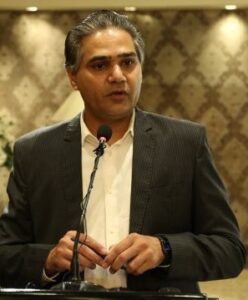 Director PIPS Muhammad Amir Rana, who moderated the session, in his introductory remarks said that the document was the continuity of all efforts that have been made to bring sustainable pace in the country during the last two decades. He said that peace had specific meanings in the context of Pakistan. He explained that different expressions came from the state institutions, intelligentsia, and civil society of the country to deal with growing challenge of terrorism and extremism since it started gaining strength.
Director PIPS Muhammad Amir Rana, who moderated the session, in his introductory remarks said that the document was the continuity of all efforts that have been made to bring sustainable pace in the country during the last two decades. He said that peace had specific meanings in the context of Pakistan. He explained that different expressions came from the state institutions, intelligentsia, and civil society of the country to deal with growing challenge of terrorism and extremism since it started gaining strength.
He said that many policies in the past had been made to counter the menace. “The issue didn’t come before us abruptly.” This issue was once also linked with the growing strength of religious sects and at some point, it was connected with the policies of state institutions or even foreign policy of Pakistan, he said. It was also seen in the context of social contract, he added.
He said that after different efforts of the state and the civil society, the necessity arises in the end that there was a need to see the social contract of powerful sections of the society with the weak segments. He said that the powerful should make social contract stronger with the weak, including with those belonging to the minorities, either economically or socially. “This will transform the society and change the directions of the society and the state.” He said that the charter actually reflects the interests of the weak segments in an effort to revive the actual soul of the society.
He argued that there was no exemplary constitution in the world, and it had to evolve while taking into consideration the changing social needs of the country. Giving the context of CoP, director PIPS said the social contract was considered bigger even than the constitution and society keeps on reviewing it to meet the challenges of changing trends and new necessities.
Joint Director PIPS Safdar Sial unveiling the purpose and main points of the “Charter of Peace” viewed that the role of civil society organizations in peace building, interfaith harmony and social cohesion has increased all over the world –a primary reason to launch the document. He urged that civil society organizations should increase their role in peacebuilding in the country to synergize and make relevant the peace efforts.
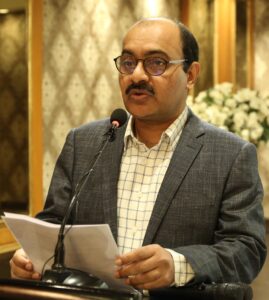 Sial further said that the CoP also conforms to the United Nation resolutions, which urge the role of civil society in building peace and CVE. For example, in its resolution 2178 (2014), the Security Council “encourages Member States to engage relevant local communities and non-governmental actors in developing strategies to counter the violent extremist narrative,” he explained, Similarly, in Resolution 2354 (2017), the Security Council recognized that efforts to counter terrorist narratives can benefit through engagement with a wide range of actors, including youth, families, women, religious, cultural, and education leaders, and other concerned groups of civil society. He said that lessons learnt from international initiatives on peacebuilding coupled with Pakistan’s own needs and context can help in framing CVE responses in the country, and the Charter of Peace was one such effort.
Sial further said that the CoP also conforms to the United Nation resolutions, which urge the role of civil society in building peace and CVE. For example, in its resolution 2178 (2014), the Security Council “encourages Member States to engage relevant local communities and non-governmental actors in developing strategies to counter the violent extremist narrative,” he explained, Similarly, in Resolution 2354 (2017), the Security Council recognized that efforts to counter terrorist narratives can benefit through engagement with a wide range of actors, including youth, families, women, religious, cultural, and education leaders, and other concerned groups of civil society. He said that lessons learnt from international initiatives on peacebuilding coupled with Pakistan’s own needs and context can help in framing CVE responses in the country, and the Charter of Peace was one such effort.
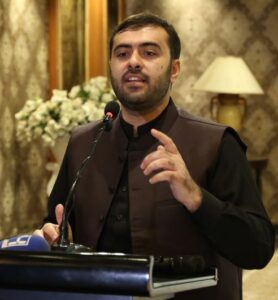 Political Assistant to the Chief Minister Punjab Zain Ali Bhatti, the chief guest of the ceremony, said that despite any political or religious association, every person has its own status in the society without any discrimination. He insisted the need to bring equality in the society to bring new ideas saying that the process could be instrumental for policy making and to bring peace in the society.
Political Assistant to the Chief Minister Punjab Zain Ali Bhatti, the chief guest of the ceremony, said that despite any political or religious association, every person has its own status in the society without any discrimination. He insisted the need to bring equality in the society to bring new ideas saying that the process could be instrumental for policy making and to bring peace in the society.
He said that interfaith harmony was necessary and advised the participants to avoid indulging in ever-increasing divisions and polarization in the society. “We are a divided nation,” he said and referred to the social media by saying that difference of opinion is rarely tolerated over such platforms. “We should have clarity in our ideas and thoughts to move forward.”
Bhatti endorsed the CoP saying that its message should reach people in every village, town, and city. He also said that existing laws should be reviewed to point out loopholes and make improvements in these to attain long-lasting peace in the country.
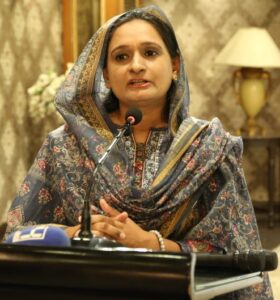 Dr Sarah Ahmad of the Lahore College for Women University (LCWU) appreciated the initiative of CoP. She said that 63 per cent of the population belonged to youth and no initiative could be taken without its engagement. She said that civil society had an important role in eliminating extremism and for de-radicalization as the government couldn’t perform better without it. She argued that there was need to adopt soft approaches to eliminate extremism and terrorism and added that women should also paly their due role in this regard.
Dr Sarah Ahmad of the Lahore College for Women University (LCWU) appreciated the initiative of CoP. She said that 63 per cent of the population belonged to youth and no initiative could be taken without its engagement. She said that civil society had an important role in eliminating extremism and for de-radicalization as the government couldn’t perform better without it. She argued that there was need to adopt soft approaches to eliminate extremism and terrorism and added that women should also paly their due role in this regard.
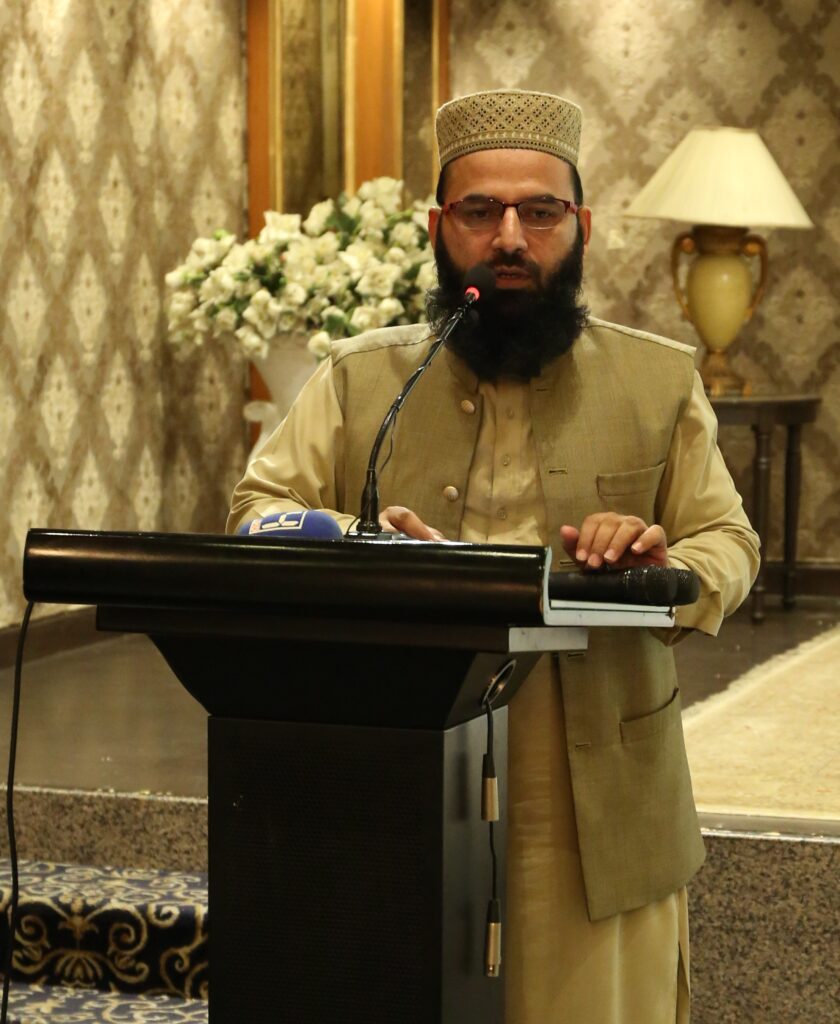 Religious scholar Ziaul Haq Naqshbandai deplored that they lived in an atmosphere of extreme polarization where people unfortunately used the religion for their vested interests and were in the habit of issuing decrees against their opponents. “This trend has spread from religious parties to political groups.” He said that Pakistan did not belong to any faith or sect or group, but it was inclusive and for all. He said that anyone having Pakistani citizenship should be guaranteed to live independently according to his/her faith.
Religious scholar Ziaul Haq Naqshbandai deplored that they lived in an atmosphere of extreme polarization where people unfortunately used the religion for their vested interests and were in the habit of issuing decrees against their opponents. “This trend has spread from religious parties to political groups.” He said that Pakistan did not belong to any faith or sect or group, but it was inclusive and for all. He said that anyone having Pakistani citizenship should be guaranteed to live independently according to his/her faith.
Naqshbandi said that when rule of law would not be ensured, there was chaos and unrest. He said that it was the need of the hour that the Constitution of Pakistan should be implemented in its true spirit. He stressed for bringing tolerance and moderation in the society.
Maulana Rageb Naeemi, religious scholar and Principal Jamia Naeemia Lahore, in his concluding remarks admitted that CoP has different aspects and had been linked with the interfaith harmony, acceptance of diversity in the society, ending unrest and solving economic, and social problems in the society. He said that the document talked about tolerance and harmony among inter-sect or inter-religion and intra-sect or intra-religion. “We understand that CoP covers all aspects, and an effort has been made that people belonging to different faiths and sects come close and ensure diversity in the society.” He said that there was diversity with regards to religions, sects and tribes within the State of Madina and referred to the Charter of Madina. The purpose of providing the context is how different sects or faiths can live in Pakistan peacefully, he added.
Naeemi deplored that the problem in Pakistan was that most of the newly emerged and even old religious groups tend to extremism because they focus only on one-point agenda and ignore rest of Islamic teachings. We see turmoil and people standing polls apart in the society as a result of such ideas.
 Naeemi viewed that every modern nation state in the world has its own constitution or social contract, and the Constitution of Pakistan was such a document which talked in detail about every group or segment of the society. He questioned whether their institutions that provide education of religious and contemporary disciplines teach the students about the sanctity of the constitution? He concluded that this has to be seen that whether Pakistan that came into being in the name of Islam can accommodate other religions and take them along?
Naeemi viewed that every modern nation state in the world has its own constitution or social contract, and the Constitution of Pakistan was such a document which talked in detail about every group or segment of the society. He questioned whether their institutions that provide education of religious and contemporary disciplines teach the students about the sanctity of the constitution? He concluded that this has to be seen that whether Pakistan that came into being in the name of Islam can accommodate other religions and take them along?

